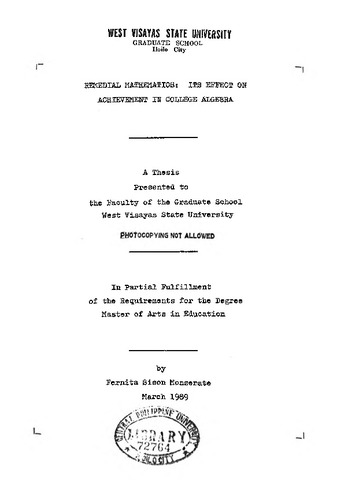Показать сокращенную информацию
Remedial mathematics: Its effect on achievement in college algebra
| dc.contributor.adviser | Sillorequez, Editha Y. | |
| dc.contributor.author | Monserate, Fernita Sison | |
| dc.date.accessioned | 2021-10-11T00:39:08Z | |
| dc.date.available | 2021-10-11T00:39:08Z | |
| dc.date.issued | 1989 | |
| dc.identifier.citation | Monserate, F. S. (1989). Remedial mathematics: Its effect on achievement in college algebra (Unpublished Master’s thesis). West Visayas State University, Iloilo City. | en_US |
| dc.identifier.uri | https://hdl.handle.net/20.500.12852/1505 | |
| dc.description | Introduction and Statement of the Problem | en_US |
| dc.description.abstract | Introduction The development of skills and attitudes necessary for success in any vocation is one of the objectives Central Philippine University has set for itself. As a church-related institution, it seeks to order its academic life so as to be expressive of a deep Christian commitment. To fulfill this mission, Central Philippine University has solicited funds from alumni and friends to finance special programs of the university. One of these programs is the offering of remedial classes in English and Mathematics for college students. At the start of every semester or summer at Central Philippine University, a mathematics placement test is given to all entering freshmen. Those who do not come up to a certain score are required to enroll in Mathematics A, a remedial course. Mathematics A aims to remedy the deficiencies of students in this area so that their chances of passing the first basic mathematics course is increased. Students pay tuition for Mathematics A. When they pass this remedial course and are admitted to the first basic mathematics course, they are exempted from paying tuition to this basic course. If they do not pass in Mathematics A, they will be required, to re-enroll in the remedial course and pay the tuition. Despite this financial arrangement, many parents question the offering of the remedial course. This study, therefore, attempts to examine the effect of remedial mathematics on achievement in College Algebra. The focus of attention is on achievement in College Algebra, since it is the first college mathematics course taken by all students in all the bachelor degree programs. It is the course where a great majority of the college students have failed every year. If the results of this study will prove that remedial mathematics is of significant value to the student' achievement in College Algebra, then the administration is justified in offering the remedial course and the university has to find means so that this program can be continued for free for the benefit of the students. If the results show that remedial mathematics has no significant value, that is, it does not significantly contribute to the student's achievement in College Algebra, then the earlier the university discovers this, the earlier would be the saving of money on the part of the university which could be used for the implementation of more fruitful projects. Time and effort could be saved by both students and remedial teachers. The Problem Statement of the problem. This study attempted to determine the effect of remedial mathematics on achievement in College Algebra. Specifically, this study sought answers to the following questions: 1. Is there a significant difference between the placement test scores of students who barely passed the mathematics placement test and those who failed when the subjects were taken as an entire group? 2. Is there a significant difference between the placement test scores of students who barely passed the mathematics placement test when the subjects were classified as to sex and type of high school attended? 3. Is there a significant difference between the placement test scores of students who failed in the mathematics placement test when the subjects were classified according to sex and type of high school attended? 4. Is there a significant difference between the achievement in College Algebra of the students who barely passed the mathematics placement test ("no remedial mathematics” group) and those who failed in the mathematics placement test ("with remedial mathematics" group) when they were taken as an entire group? 5. Is there a significant difference between the achievement in College Algebra of the "no remedial mathematics" group when they were classified according to sex and type of high school attended? 6. Is there a significant difference between the achievement in College Algebra of the "with remedial mathematics" group when they were classified according to sex and type of high school attended? 7. When the "with remedial mathematics" group was taken as an entire group, is there a significant relationship between their (a) placement test scores and achievement in College Algebra and (b) grades in remedial mathematics and achievement in College Algebra? | en_US |
| dc.format.extent | 77 leaves | en_US |
| dc.language.iso | en | en_US |
| dc.subject.ddc | GSL Theses 378.242 M759 | en_US |
| dc.subject.lcsh | Academic achievement | en_US |
| dc.subject.lcsh | Mathematics--Remedial teaching | en_US |
| dc.subject.lcsh | Algebra--Study and teaching (Higher) | en_US |
| dc.title | Remedial mathematics: Its effect on achievement in college algebra | en_US |
| dc.type | Thesis | en_US |
| dc.description.bibliographicalreferences | Includes bibliographical references | en_US |
| dc.contributor.chair | Arellano, Elvira L. | |
| dc.contributor.committeemember | Corral, Lea N. | |
| dc.contributor.committeemember | Ledesma, Teresita B. | |
| dc.contributor.department | Graduate School | en_US |
| dc.description.degree | Master of Arts in Education | en_US |
Файлы в этом документе
Данный элемент включен в следующие коллекции
-
Theses [18]


